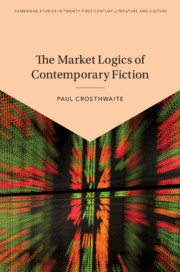Book contents
- The Market Logics of Contemporary Fiction
- Cambridge Studies in Twenty-First-Century Literature and Culture
- The Market Logics of Contemporary Fiction
- Copyright page
- Dedication
- Contents
- Acknowledgements
- Introduction
- Part I The Emergence of Market Metafiction
- Part II The Phantasmagorias of Contemporary Finance
- Part III The Market Knows
- Part IV The Moment of Market Metafiction
- Notes
- Index
Part III - The Market Knows
Published online by Cambridge University Press: 04 July 2019
- The Market Logics of Contemporary Fiction
- Cambridge Studies in Twenty-First-Century Literature and Culture
- The Market Logics of Contemporary Fiction
- Copyright page
- Dedication
- Contents
- Acknowledgements
- Introduction
- Part I The Emergence of Market Metafiction
- Part II The Phantasmagorias of Contemporary Finance
- Part III The Market Knows
- Part IV The Moment of Market Metafiction
- Notes
- Index
Summary
This chapter argues that the big, brainy, intricately structured American novel that goes by the name of the “encyclopedic” or “systems” novel is shaped by an ambivalent relation to the correspondingly capacious, complex, and informationally rich sphere of the financial markets. It begins by tracing the idea of the all-knowing market from Adam Smith to the “efficient market hypothesis” that continues to dominate the discipline of financial economics today, and shows how this intellectual history has intersected with the history of the novel. The chapter challenges the critical consensus that reads the contemporary "big novel" as defined by the determinism of conspiracy plotting, and argues that it is more closely aligned with the contingent – yet collectively synchronized – dynamics of the classically “efficient” market. The latter portion of the chapter shows how major encyclopedic or systems texts – by Thomas Pynchon, William Gaddis, Richard Powers, Jonathan Franzen, David Foster Wallace, and Garth Risk Hallberg – position the omniscient financial market as performing both a redemptive mapping and an oppressive (and aggressively masculine) surveilling of the social totality.
Keywords
- Type
- Chapter
- Information
- The Market Logics of Contemporary Fiction , pp. 127 - 184Publisher: Cambridge University PressPrint publication year: 2019

